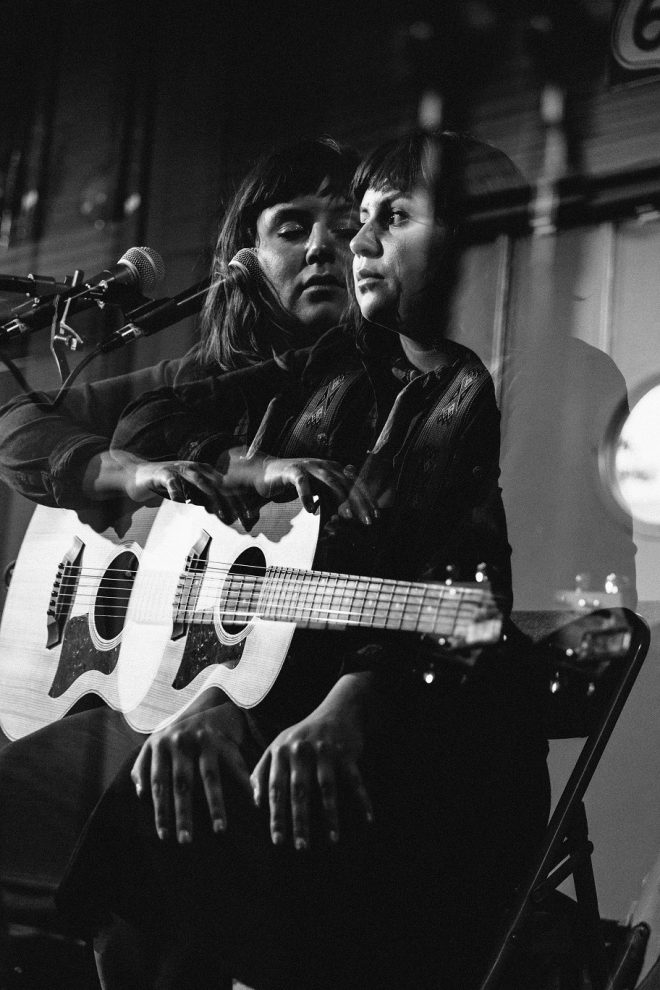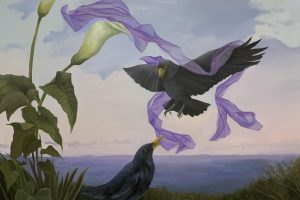CADENCE OF THE MOMENT

Award-winning Indigenous artist and musician Kalyn Fay has only been performing and touring since 2014, but her heartfelt lyrics explore a timeless vulnerability.
WORDS / JULIA M. TRUPP
PHOTO / RYAN MAGNANI
Kalyn Fay grew up playing music, but she had no idea she could hold a tune until she was 21 years old.
Nine years later, she has released two full-length albums with another in the works, performed as an inaugural member of Northwest Arkansas’s songwriting retreat House of Songs and toured as far away as Denmark. A Tulsa native, Fay now lives and works in Northwest Arkansas, but her journey extends past physical borders, connecting her inner world, her outer experiences, her Indigenous roots and the thread that holds us all together—time.
In her adolescence, Fay played trumpet in her school band and taught herself how to play piano, but it wasn’t until she decided to teach herself how to play guitar in college that she realized she could also sing.
“I never thought I could sing, so I just didn’t,” she said. “I have a low register voice, so in my mind that meant I was bad at singing because I couldn’t sing along with a lot of things.”
As she dove headfirst into her musical journey, she spent time learning how to become a professional musician and what that would look like for someone heavily involved in the pursuit of higher education—she has a bachelor’s and master’s degree and is now in her thesis year of her Master of Fine Arts in printmaking at the University of Arkansas.
Much of Fay’s songwriting process comes from her own observations and experiences. Her phone’s notes are filled with descriptions of places she’s visited or quotes from meaningful conversations that she uses to craft her songs, which map out stories and connect to people who may be dealing with similar feelings.
“For me, a lot of how I write music is based on the cadence of the moment,” she said. “A lot of [the] time I’m trying to capture the feeling. There’s something about sounds and poetry that allows you to move both in the past and forward. You’re not stuck in one moment. You can be nostalgic and speak to the future.”
When Fay started writing music, she was searching for a way to understand her inner self. She struggled moving away from family in Oklahoma to pursue her education on top of reasoning with her faith and religious beliefs. Processing her feelings pushed her to write music, but she eventually realized she could also write from experience without “having to exist in a state of sadness,” she said, after seeing one of her favorite musicians, Lucinda Williams, perform in Oklahoma City.
“She solidified it,” Fay said. “You don’t have to be sad to write good music. You can just pull from a large well of experiences. It was a good lesson to learn early on. I saw a lot of great musicians fall off and away from the industry because they were hurting themselves or doing harmful things because they thought it would make them better [musicians], and it didn’t.”
She spent about five years building up a song base, touring and playing shows in her hometown of Tulsa, and she finally hit a point where she felt like she had enough songs to start recording.
Then came Bible Belt in 2016, an album that evokes a sense of vulnerability, a narrative of life lived and an homage to her heritage.
“All the experiences are ingrained in [my] Indigenous understanding. I’ve taken a lot of my time here to better understand relationships and ways of being, and I’m just realizing how much those belief systems impact the way I think about the landscape and my relationship with other people. I spend a lot of time traveling between Arkansas and Oklahoma to visit family. [The record is] a lot about being present, observing […] and thinking about liminal space; when you finally hit those points that feel like home.”
Liminality and time are constants in Fay’s life, as reflected in advice she once received that now guides her everyday: “Time is going to pass anyway, you might as well give it the best you have.”
“I have always loved that, and that’s kind of how I have existed,” she said. “The time is going to pass, so I might as well learn and pursue new things. Don’t worry about failing or not doing good enough. It’s really empowering! I love thinking about the future and what it could be. Sometimes it’s easy to discount yourself and the opportunities you can build for yourself. It’s nice to just say, ‘No, just do it,’ and if it doesn’t work out it’s okay.”
A new opportunity for the rising musician came knocking in 2017 when House of Songs, an Austin-based songwriter summit, opened a location in Northwest Arkansas. Fayetteville Roots Festival cofounder and summit participant Bryan Hembree recruited Fay to be a part of the inaugural cohort. She had only visited Arkansas to see her family in the past, but after spending more time in Northwest Arkansas for the songwriters’ summit and as part of the Fayetteville Roots Fest lineup, she fell in love and decided to relocate to pursue her next degree and gain new connections in the industry.
“I’ve created so many friendships out of that experience, and [House of Songs came] at a point where I needed to push myself creatively,” she said.
Since participating in House of Songs’ first year in NWA, Fay has toured through the southwest, performed as part of Folk Alliance International, participated as a U.S. delegate to the Indigenous Music Summit, sat on several panels and boards and won various accolades for her work in both music and visual art. Most recently, she was the recipient of a 2020 Artists 360 grant, which she hopes to put toward recording and producing her next album, featuring cellist Matt Magerkurth, this fall. “This entire next record is a little shift from my previous records,” she said. While she usually records with a full band, she’s trying something new on this one. “It’s significantly more sparse as a duo.”
While touring isn’t in her near future, Fay is still trying to find a way to connect with people through her music and art. Whether an online performance, exhibition or outdoor event (once the seasons change), the motivator at the forefront of Fay’s mind is finding meaningful connections through different perspectives.
“I never thought I would be where I am and am still surprised. This has been something so much more than I thought it would. I thought I was going to be a doctor and travel. Then I moved into graphic design and art and started to make music. Music has allowed me to travel and understand perspectives more than anything else,” Fay said. “Meaningful connection is what I was missing before. Music allows you to do that and you don’t even have to be present. [People are] listening to your music and sharing that moment with you whether you’re present or not.”
// KALYNFAY.COM





Comments